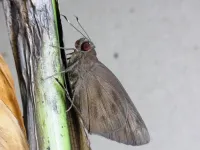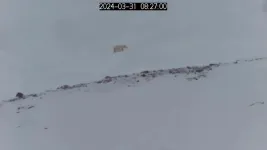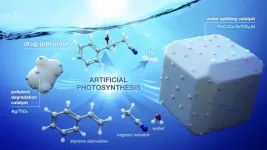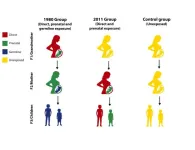From dormant to danger: How VZV reactivation is driving CNS infections
Researchers report an alarming increase in varicella zoster virus (VZV) infections in adults calling for vaccination and public health measures
2025-02-27
(Press-News.org)
The varicella zoster virus (VZV), an infectious virus from the herpes virus family, is primarily known to cause varicella in children and shingles in adults. But lately, this virus has also been reported to trigger severe complications like central nervous system (CNS) infections. Researchers from Fujita Health University, Japan, conducted a comprehensive study spanning 10 years (2013–2022), to identify the VZV-related infections affecting the CNS. Their study reveals a marked increase in adult VZV-related CNS infections, particularly since 2019. The findings were published in Volume 30, Issue 12 of the Emerging Infectious Diseases journal on December 30, 2024.
The study was led by Professor Tetsushi Yoshikawa, along with Hiroki Miura and Ayami Yoshikane from the Department of Pediatrics, Fujita Health University School of Medicine. The researchers analyzed cerebrospinal fluid samples of 615 adult patients with suspected CNS infections. VZV DNA was most frequently detected in these patients, with its presence in 10.2% of the cases, and aseptic meningitis being the most common infection.
The data from 2019 to 2022 revealed that there was a noticeable rise in VZV DNA-positive cases, forming a distinct temporal cluster during this period. Professor Yoshikawa highlighted the results of the patient demographic analysis, reporting that "the proportion of aseptic meningitis increased from 50% between 2013 and 2018 to 86.8% between 2019 and 2022." He further adds, “Similar to the rise in herpes zoster cases through VZV reactivation in the elderly, we believe this increase is also linked to VZV reactivation.”
The universal varicella vaccination, introduced in Japan in 2014, has reduced the natural booster effects from re-exposure to the virus. This potentially accelerates the immunity decline, leading to VZV reactivation, especially in cases like shingles. The researchers emphasize the connection between the vaccination and the current scenario, saying, “The increase in VZV-induced CNS infections coincides with changes in varicella vaccination programs and emphasizes the need for better preventive strategies.”
Furthermore, the researchers examined trends in VZV-induced CNS infection throughout the observation period using Kulldorff’s circular spatial scan statistics. As a result, it was confirmed that there was an accumulation of VZV-related CNS infections from 2019 to 2022. Although no direct causation was established, six patients did develop CNS infections after receiving COVID-19 vaccines.
“Further studies are needed to understand these interactions,” Yoshikawa notes. None of the eligible patients in this study had received the zoster vaccine, which was introduced in Japan in 2016. Increasing the number of VZV-related CNS infections underscores the importance of zoster vaccination in adults.
The research team stresses the broader implications of their findings, stating that the reactivation of VZV in the CNS is linked to an increased risk of dementia, including Alzheimer’s disease. They hypothesize, “If the prevention of VZV-related aseptic meningitis through herpes zoster vaccination is possible, these vaccinations could play a pivotal role in mitigating these risks of dementia.”
To address the growing concern, the research team advocates expanding public health initiatives to promote zoster vaccination among at-risk populations. “Our research underscores the necessity of proactive measures to prevent not just shingles, but also severe neurological complications associated with VZV,” explains Yoshikawa.
With the rise of the aging population and CNS infections, the study calls for urgent action to evaluate and implement comprehensive vaccination strategies to prevent CNS infections in the future.
***
Reference
DOI: 10.3201/eid3012.240538
About Fujita Health University
Fujita Health University is a private university situated in Toyoake, Aichi, Japan. It was founded in 1964 and houses one of the largest teaching university hospitals in Japan in terms of the number of beds. With over 900 faculty members, the university is committed to providing various academic opportunities to students internationally. Fujita Health University has been ranked eighth among all universities and second among all private universities in Japan in the 2020 Times Higher Education (THE) World University Rankings. THE University Impact Rankings 2019 visualized university initiatives for sustainable development goals (SDGs). For the “good health and well-being” SDG, Fujita Health University was ranked second among all universities and number one among private universities in Japan. The university became the first Japanese university to host the "THE Asia Universities Summit" in June 2021. The university’s founding philosophy is “Our creativity for the people (DOKUSOU-ICHIRI),” which reflects the belief that, as with the university’s alumni and alumnae, current students also unlock their future by leveraging their creativity.
Website: https://www.fujita-hu.ac.jp/en/index.html
About Professor Tetsushi Yoshikawa from Fujita Health University
Professor Tetsuhi Yoshikawa is a distinguished pediatrician and researcher at Fujita Health University in Japan. Specializing in immunology and virology, most of his research focuses on human herpesvirus 6 (HHV-6) and its impact on pediatric diseases. He has authored over 377 articles, including 22 review articles, and has contributed to 5 book chapters. His study of Herpesviridae is interdisciplinary in nature, drawing from both herpes simplex virus, antibody titer, cord blood, and transplantation. He has a world ranking of 2,047 and his contributions have significantly advanced the understanding of pediatric virology and immunology.
Funding information
This research was supported by AMED under grant nos. 23fk0108612h1903 and 22fk0108634j0001
END
[Attachments] See images for this press release:
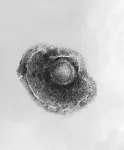
ELSE PRESS RELEASES FROM THIS DATE:
2025-02-27
CABI has led a team of scientists who have used DNA barcodes to narrow down the possible sources of introductions of an invasive banana skipper butterfly, with implications as to the threat of it spreading to Africa and tropical America.
The banana skipper, Erionota torus Evans (Lepidoptera, Hesperiidae, Hesperiinae, Erionotini) is a South-east Asian pest of banana that, in the last 60 years, has spread to the southern Philippines, Taiwan, Japan, India, Sri Lanka, Mauritius and La Réunion.
The new research, published in the journal CABI Agriculture and Bioscience, analysed a partial library of DNA barcodes from the indigenous and introduced ranges and suggests that aircraft are likely ...
2025-02-27
Global partnerships that embed scientific research into clinical care are revolutionising the diagnosis and treatments for children with rare genetic diseases, according to a new report.
The white paper found despite advances in genomic technologies, which can detect rare genetic diseases within days, there remained significant challenges to ensuring this leads to improved child health outcomes. But global collaborations, such as the International Precision Child Health Partnership (IPCHiP), using evidence-based approaches to inform decisions in real-time, are overhauling patient care.
The paper was led by Murdoch Children’s Research Institute (MCRI), The Hospital for Sick ...
2025-02-27
Svalbard, Norway – February 27, 2025 – Researchers from Polar Bears International, San Diego Zoo Wildlife Alliance, the Norwegian Polar Institute, and the University of Toronto Scarborough reveal the first detailed look at polar bear cubs emerging from their dens, captured through nearly a decade of remote camera footage in Svalbard, Norway. This research, published today on International Polar Bear Day in the Journal of Wildlife Management, marks the first combination of satellite tracking collars with remote camera traps to answer ...
2025-02-27
A research team led by Assistant Professor Shogo Mori and Professor Susumu Saito at Nagoya University has developed a groundbreaking method of artificial photosynthesis that uses sunlight and water to produce energy and valuable organic compounds, including pharmaceutical materials, from waste organic compounds. This achievement represents a significant step toward sustainable energy and chemical production. The findings were published in Nature Communications.
“Artificial photosynthesis involves chemical reactions ...
2025-02-27
In 1982, the Syrian government besieged the city of Hama, killing tens of thousands of its own citizens in sectarian violence. Four decades later, rebels used the memory of the massacre to help inspire the toppling of the Assad family that had overseen the operation.
But there is another lasting effect of the attack, hidden deep in the genes of Syrian families. The grandchildren of women who were pregnant during the siege — grandchildren who never experienced such violence themselves — nonetheless bear marks of it in their genomes. ...
2025-02-27
When faced with chronic stress, why do some people develop anxiety and depressive symptoms while others show resilience? A protein that acts as a cannabinoid receptor and is present in the structure controlling exchanges between the bloodstream and the brain could be part of the answer, according to a study published today in Nature Neuroscience.
“The protein, called cannabinoid receptor type 1 (CB1), is part of the blood-brain barrier, the dynamic structure that protects the brain by regulating the passage of molecules between the bloodstream and ...
2025-02-27
A new study led by researchers at Mass General Brigham suggests a nasal spray developed to target neuroinflammation could one day be an effective treatment for traumatic brain injury (TBI). By studying the effects of the nasal anti-CD3 in a mouse model of TBI, researchers found the spray could reduce damage to the central nervous system and behavioral deficits, suggesting a potential therapeutic approach for TBI and other acute forms of brain injury. The results are published in Nature Neuroscience.
“Traumatic brain injury is a leading cause of death and disability — including cognitive decline ...
2025-02-27
Covid-19 showed us how vulnerable the world is to pandemics – but what if the next pandemic were somehow engineered? How would the world respond – and could we stop it happening in the first place?
These are some of the questions being addressed by a new initiative launched today at the University of Cambridge, which seeks to address the urgent challenge of managing the risks of future engineered pandemics.
The Engineered Pandemics Risk Management Programme aims to understand the social and biological factors that might drive an engineered pandemic and to make a major contribution ...
2025-02-27
The researchers challenge the widespread belief that AI-induced bias is a technical flaw, arguing instead AI is deeply influenced by societal power dynamics. It learns from historical data shaped by human biases ,absorbing and perpetuating discrimination in the process. This means that, rather than creating inequality, AI reproduces and reinforces it.
“Our study highlights real-world examples where AI has reinforced existing biases.” Prof. Bircan says. “One striking case is Amazon’s AI-driven hiring tool, which was found to favor male candidates, ultimately reinforcing gender disparities in the job market. Similarly, government AI fraud detection ...
2025-02-27
The following is a Q&A with Dr Nerea Casal García, a sports scientist focusing on sports training and performance optimization. To speak to the author, or to receive an advance copy of the paper, please write to: press@frontiersin.org The paper will be published on 27 Feb 2025 06:15 CET]
Dr Nerea Casal García is an athlete, personal coach, and injury readaptation specialist who last year completed a PhD on observational analysis in elite sports. Today, she is a professor at the Institut Nacional ...
LAST 30 PRESS RELEASES:
[Press-News.org] From dormant to danger: How VZV reactivation is driving CNS infections
Researchers report an alarming increase in varicella zoster virus (VZV) infections in adults calling for vaccination and public health measures

